Manufacturing War: Confronting Russia to Legitimate NATO
February 5, 2022 at 2:58 pm | Posted in Uncategorized | 4 CommentsTags: Eastern Europe, Europe, European Union, France, Germany, NATO, Political Economy, Russia, Ukraine, United Kingdom, United States
Ukrainian President Volodymyr Zelensky’s sharp rebuke to Washington, London, and the NATO headquarters in Brussels to tone down their rhetoric of an impending Russian invasion of his country offers an uncanny parallel to his role as a fictional president of Ukraine in an episode in the television series Servant of the People when he says
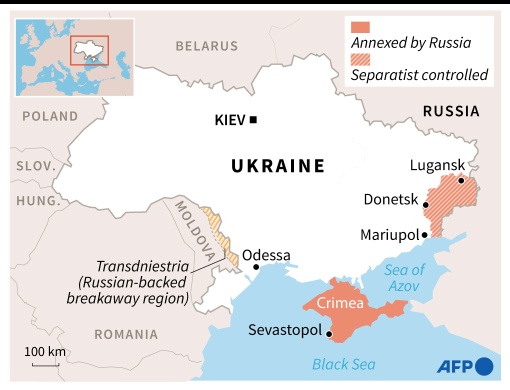
President Zelensky’s rebuttal of claims of an impending Russian attack also underscores how monochromatic the reporting in the United States and the United Kingdom have been about the situation in Eastern Europe: Russian President Vladimir Putin is seen as the scheming autocratic villain intent on swallowing up Ukraine or at least making it a vassal state. This black-and-white portrayal obscures the role played by the United States in manufacturing the present crisis.
In the first instance, rather than an inter-state conflict between Ukraine and Russia, in 2014, the Obama administration inserted the United States into an ongoing Ukrainian civil war—between the pro-Russian East and the pro-European West–by cheering on the protestors attacking the popularly elected Rada, the national parliament, and the president Viktor Yanukovych. The portrayal of Russia as the aggressor has also met with a more muted response by many European states—especially Germany—not only because of their dependence on Russian supplies of gas but also because of seismic geopolitical shifts caused by the emergence of China.
Though the dominant narrative in the Anglosphere portrays conditions in Eastern Europe and Russia as a transition to “democracy from communist authoritarianism,” Washington’s support for Boris Yeltsin’s armed assault on the popularly elected Russian parliament, his ‘shock therapy’ which deprived millions of their livelihoods brutally, his acquiescence in the oligarchs appropriating state assets, and his imposition of a “presidential” constitution is what now empowers President Putin to act authoritatively as the late Stephen Cohen underlined.
In November 2013, then Ukrainian President Viktor Yanukovych refused to sign an agreement with the European Union that would have led to Ukraine cutting off many ties to Russia as it would have alienated Russian-speaking citizens. This spurred demonstrators against his government to mobilize outside the Rada. Eventually, the foreign ministers of France, Germany, and Poland, in the presence of Russians envoys, negotiated a compromise in February 2014: Yanukovych would continue as president till December when there would be both parliamentary and presidential elections and till then a government of national unity would be in place. Within hours of this agreement being signed, as the security forces stood down, violent demonstrators, some of whom sported neo-Nazi symbols, forced President Yanukovych to flee to Russia.
The United States had a key role in this coup d’etat. In a tapped phone conversation released on YouTube, between the then U.S, ambassador to Ukraine and Victoria Nuland, then the Assistant Secretary of State for European and Eurasian Affairs—and currently Biden’s Under Secretary of State for Political Affairs—they were heard discussing the constitution of a post-Yanukovych government and Nuland’s preferred candidate, Arseniy Petrovych Yatsenyuk, became prime minister after Yanukovych fled the country. Nuland also ruled out EU mediation: “Fuck the EU” she is heard saying on tape! She was also recorded as saying that the then Vice President Biden will go to Ukraine to lend legitimacy to the new regime—as he did later in the year.
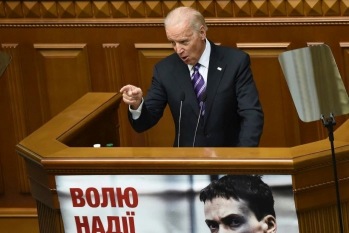
Rather than provoking Russia into an invasion or meekly accepting the coup, Putin frustrated US State department specialists by endorsing the results of the referendum in predominantly pro-Russian Crimea to merge with Russia (thereby securing also the important Russian Black Sea naval base of Sevastopol) and supported secessionist movements by Russian speakers in the Donbas region where they proclaimed the Donetsk and Luhansk People’s Republics. Since then there had been a low-intensity conflict between Ukrainian forces and the forces of the two people’s republics that has been rarely been mentioned in the current context. After 2014, the United States has given Ukraine over $2 billion in military aid. By March 2021, after Nuland was back in the State department, Ukraine started mobilizing against secessionist forces in Donbass which prompted Russia to move troops and conduct military exercises on the borders.In June 2021, a British destroyer sailed into the territorial waters of Crimea, provoking the Russians and they consider a training base the U.K. is building in Ukraine to be a military outpost. There are also at least 200 members of the Florida National Guard in Ukraine.
There is a stark geopolitical asymmetry in the geo-political importance of the Ukraine to Russia and the United States. Ukraine’s membership in NATO and stationing of missiles there would mean that missiles launched from there can reach Moscow in five to seven minutes. It is debatable whether Americans would support the dispatching soldiers to defend Ukraine—and as the country is not in NATO, Washington has no obligation to defend it.
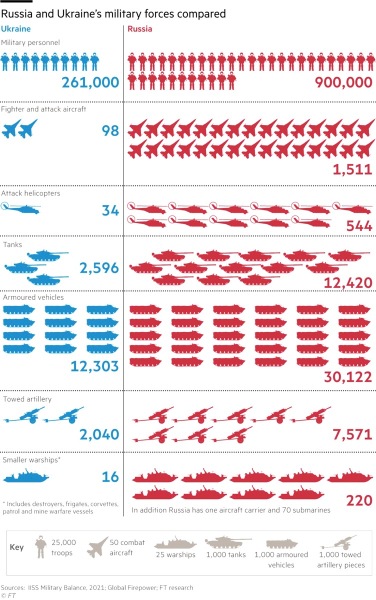
There is also little appetite in Ukraine for NATO membership:
Kremlin’s demand that Ukraine be permanently barred from NATO membership is only an opening gambit as Russian policy makers surely know that there is not even a remote possibility of such a treaty being ratified by a divided U.S. Senate.
Manufacturing a conflict with Russia however is central to NATO: without an enemy, what is its raison d’être? Former President Trump called the alliance outdated and President Emmanuel Macron of France said it is ‘brain dead.’ Far from being a defensive alliance, NATO forces had aggressively intervened in the Yugoslav civil wars of the 1990s and in the Libyan civil war since 2011, and its soldiers had been sent outside Europe to Afghanistan. Member states were left high and dry when President Biden unilaterally pulled U.S. forces out of Afghanistan: the head of the German Christian Democratic Union, called it the “biggest debacle” since the creation of the Atlantic alliance. France is still smarting because of the Australian decision to cancel a submarine deal after it signed a defense pact with the U.S. and the U.K. that was negotiated in secret.
Suspicious of Anglosphere alliances, both France and Germany want to see a more unified European “security architecture’—as indicated among other things by the Normandy framework—between France, Germany, Russia, and Ukraine—to maintain a ceasefire in eastern Ukraine. In 2014, after the Russian annexation of Crimea, it was only sustained U.S, pressure that forced then French President François Hollande to cancel a deal to sell Mistral-class warships to Russia. President Macron advocates a new “stability order” in Europe that includes Russia, though he has been careful not to alienate the United States. In 2010, German military experts argued that the emergence of a multipolar world requires a framework that includes Russia in NATO: an alliance of North America, Europe and Russia against China and other emerging powers. On January 22, 2022, the German naval chief, Vice-Admiral Kay-Achim Schönbach said that Crimea is not going to be restored to Ukraine and that Germany and India need Russia against China. Former German Chancellor Gerhard Schroeder has also been the chairman of the Russian oil giant, Rosnef for several years and his Social Democratic Party which heads the current coalition government has been notably friendly to Russia.
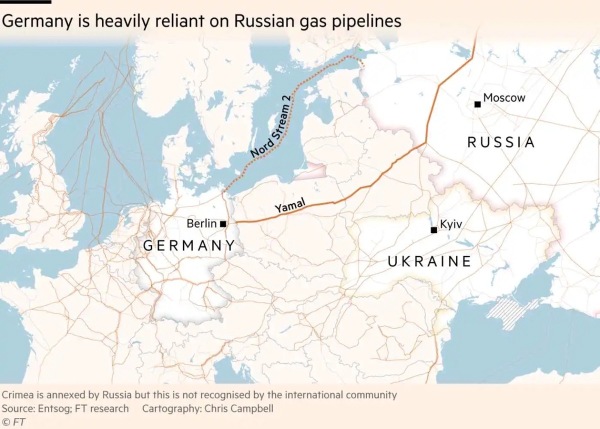
Such a “reverse Kissinger”—splitting Russia from China—is however unlikely to happen because Russia has strengthened its ties with China since 2014 as its relations with NATO member states deteriorated and Moscow’s military superiority over Beijing means it is not afraid of it unlike China’s other neighbors.Russia has also implemented measures to cushion the impact of any sanctions the U.S. and its allies may impose: it holds only 16 percent of its foreign exchange reserves in dollars and it has restructured corporate debt so that most of it is held in rubles. And only 20 percent of its sovereign bonds are held by foreigners.
Russia probably would be satisfied if NATO military advisors are withdrawn from Ukraine and there is an agreement among major players—rather than a legally-binding treaty—that Ukraine would not be admitted into NATO. However, if the U.S. were to engineer another coup in Kyiv as it did in 2014 and encourage a new regime to launch assaults against the two breakaway People’s Republics, then President Putin would be compelled by domestic pressures—already the Communist Party has called for a recognition of the two People’s Republics—to defend them militarily.
Profiles in Cowardice
February 14, 2021 at 11:29 am | Posted in Uncategorized | Leave a commentTags: democracy, Impeachment, Political Economy, Republicans, Trump, United States
There can be few instances of collective legislative debasement than that of Republicans in the United States Senate to Donald Trump. During the Republican primaries of 2016, virtually all Republican senators said that Trump was unfitting to be president and that, if elected, he would destroy the Republican Party (see this, this, this, and this). After his victory, the party abandoned its long-held principles of fiscal responsibility and advocacy for free trade as Trump presided over the three largest deficits in U.S. history during his four years in office, and imposed sanctions against major trading partners including allies in Europe and on China.

Most egregiously, after the House of Representatives impeachment managers clearly laid out Trump’s role in inciting the storming of the Capitol on January 6, 2021, a storming that put the lives of senators and representatives in mortal danger as they were certifying the results of the 2020 presidential election, they voted to acquit him. The trial is ironic in multiple ways: the senators sitting as the jury were also victims and witnesses of the storming, many of them in fear of their lives. Several of the Republicans in the Senate and the House may have colluded with the mob—allegedly giving the reconnaissance tours of the Capitol before the assault and may have been in contact with them during the assault.
One video showed a police officer intercepting Senator Mitt Romney as he was headed towards the mob, and Romney spinning around and sprinting away. Another video showed that Nancy Pelosi, the Democratic Speaker of the House of Representatives was just 58 steps away from the mob when she was spirited away. The acquittal also shredded the Republicans’ claim that they were the party of law and order as at least 138 police officers—73 from the Capitol Police and 65 from the Metropolitan Police—were injured and two others took their own lives after the storming.
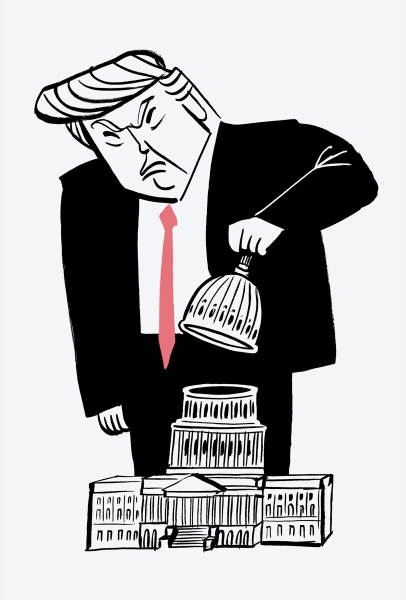
The House impeachment managers laid out a powerful case: a storyline stretching back to April 2020 when angry white nationalists stormed the Michigan legislature and Trump called them “very good people,” to the two months of relentless barrage of claims that the Democrats stole an election which he won by a “landslide,” to inviting his supporters to be “wild” at a rally at the Ellipse in Washington on the day Congress was meeting to certify the election. They juxtaposed video of his speech at the rally urging his supporters to march to Congress with the actual storming of the Capitol, his denunciation of his vice-president, Mike Pencem who had been obsequious to him for four years but had refused to overstep his constitutional authority for which he earned Trump’s wrath. The managers showed hitherto unseen video of Senators, Representatives, the Vice-President, some with their families, being escorted by the police away from the mobs: video of the Trumpists shouting “Hang Mike Pence” and seeking Speaker Pelosi. In one temporal juxtaposition, Senator Tommy Tuberville, Republican of Alabama said he spoke directly to Trump: “I said, ‘Mr. President, they just took our vice president out, they’re getting ready to drag me out of here. I got to go.’ “ At about the same time, instead of caring for the well-being of his vice-president, Trump tweeted
As an impeachment manager, Representative Joe Naguse of Colorado, said: “What did President Trump do?” he asked. “He attacked him more. He singled him out by name. It’s honestly hard to fathom.”

Republican Congresswoman Jaime Herrera Beutler of Washington, one of the eleven Republicans to vote to impeach Trump in the House, reported her conversation with Representative Kevin Mccathy, the Minority Leader who had called Trump as the Capitol was being stormed:
“When McCarthy finally reached the president on January 6 and asked him to publicly and forcefully call off the riot, the president initially repeated the falsehood that it was antifa that had breached the Capitol. McCarthy refuted that and told the president that these were Trump supporters. That’s when, according to McCarthy, the president said: ‘Well, Kevin, I guess these people are more upset about the election than you are.’This lends even more credence to House impeachment manager, Ted Lieu’s contention: “Let me be clear: The president was not just coming for one or two people, or Democrats like me. He was coming for you.”
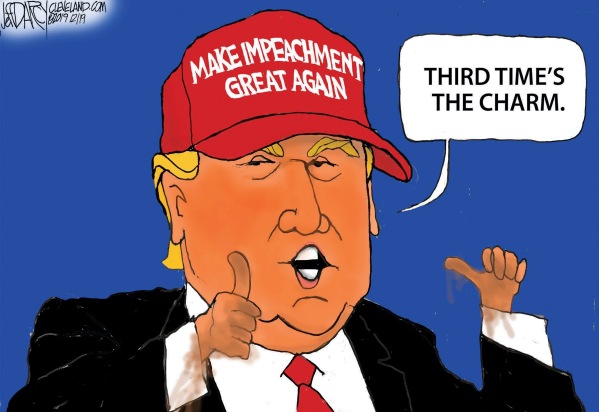
Another house manager, Delegate Stacey Plaskett of the U.S. Virgin Islands showed a video of a white supremacist, Nick Fuentes, shouting through a bullhorn in a December 2020 rally supporting Trump—the so-called second million man march:
Trump’s incitement of the mobs was conceded even by Mitch McConnell, the Republican leader in the Senate, who voted to acquit him. After the vote, McConnell said
Indeed, on the eve of Biden’s inauguration as president, McConnell had said on the Senate floor
And yet, realizing all this they voted to acquit Trump, it is said, because he commanded the allegiance of their ‘base.’ Indeed, almost immediately after Senator Bill Cassidy voted to convict Trump, the Louisiana GOP secretary Mike Bayham said, “Bill Cassidy is a senator without a party as of today.” Yet, the fear of not being reelected does not affect many senators not up for re-election in 2022 nor those who have announced their retirements: only two of the four Republican senators who have announced their retirements—Richard Burr of North Carolina and Patrick Toomey of Pennsylvania—voted to convict.

The abject dereliction of their duty by Republican senators points to a deep-seated rot in their party: as white nationalists and other Trumpists capture state and local level party organizations, it becomes virtually impossible for a Republican to win their party primaries if they do not hew to the line of Trump fundamentalists as Jeff Sessions and others who crossed Trump found. It is, as Donald Trump Jr., said at the rally on that fateful January 6: “This isn’t their Republican party any more. This is Donald Trump’s party.”
The next steps in transformation of the Republican Party to a Trump cult could well entail his daughter Ivanka challenging Marco Rubio, despite his obsequiousness to Trump, for a Florida Senate seat and Donald Jr. emerging as a presidential candidate. What will the Republican establishment do? They have already jettisoned their core principles of fiscal responsibility, free trade, and law and order. Apart from opposing abortion, lowering taxes on the rich, and promoting white nationalism, do they have any policy planks left? Are they doomed to become a vote-gathering machine for a Trump dynasty?
Insurrection in Washington! What Goes Around, Comes Around!
January 7, 2021 at 12:16 pm | Posted in Uncategorized | Leave a commentTags: Capitalism, democracy, Fascism, Political Economy, Russia, United States
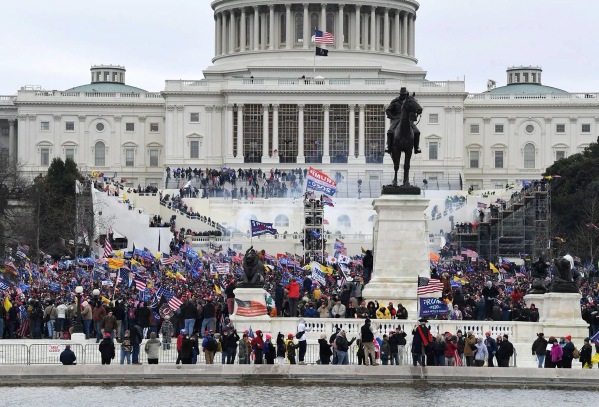
In the justifiable outrage over the storming of the United States Capitol by President Trump’s supporters as the Congress was ceremonially certifying the election of Joe Biden as the next president, mainstream media appears to have forgotten that the Clinton Administration supported Boris Yeltsin’s shelling of the Russian parliament to resolve a standoff between the legislature and the executive in October 1993.When the rapid pace of economic reform and the dissolution of economic networks following the disintegration of the Soviet Union had led to a groundswell of opposition to the Russian president, Yeltsin had begun to rule by Presidential Decrees that were obstructed by the parliament
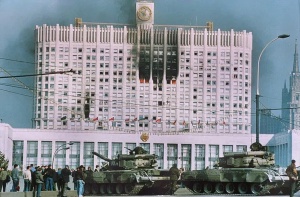
A day after tanks shelled the parliament Clinton phoned Yeltsin to congratulate him. This was the shelling of a parliament by the Russian military under orders from its commander in chief—a far more flagrant attack on democracy than all the other attacks on democracy that drew US praise and support!
More poignantly, commentators have underlined the contrast between how law enforcement agencies deal with predominantly White and Black protestors. In July 2020, as the Black Lives Matter protestors arrived in Washington, they were greeted by a massive security presence as illustrated by this photo of the Lincoln Memorial.
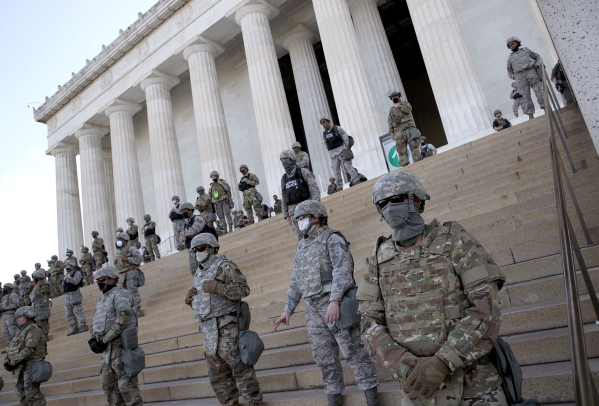
The police brutally cleared protestors from Lafayette Park for Trump to stage a photo op with the Chairman of the Joint Chief of Staff standing by his side as a loyal courtier.
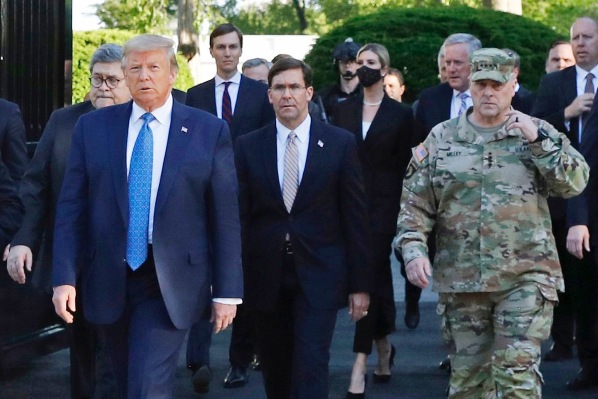
When American Disabled for Attendant Programs Today (ADAPT) activists protested for better health care or when actress Jane Fonda protested at the Capitol for legislation to reduce global warming, Capitol Police swiftly and brutally dealt with them.



But when the predominantly White mobsters who stormed into the legislative chambers, sat in the chair of the presiding officer of the Senate, ransacked the office of the Speaker of the House of Representatives, and carried the Confederate flag through the building were unhindered when they entered the building. Indeed, the Capitol police even posed for Selfies with the thugs!
Shortly before the insurrectionists broke into the Capital, Trump had egged them on:
Despite the fact that President Trump had been calling for massive protests, the Capitol police appear to have made no plans to deal with a wholly predictable insurrection! Trump’s personal lawyer Rudi Guiliani had called that very day for a “trial by combat” and even after the Capitol had been secured he had tried to call a new Senator and seek to have him prolong the certification of Biden’s election!

Even Republican supporters of Trump should be concerned with the insurrectionists—some of whom wore Auschwitz t-shirts and others paraded the Confederate flag through the halls of Congress—and of course Trump had vetoed the Military Appropriations Bill because it called for the removal of the names of Confederate generals from military bases—the only Trump veto overridden by Congress!
Hopefully, this insurrection at the Capitol will lead the US to be less supportive of anti-democratic forces elsewhere in the world!

Trump is gone: A Luta Continua
November 15, 2020 at 10:18 pm | Posted in Uncategorized | Leave a commentDonald Trump won some 8 million votes than he did four years ago and were it not for the economic devastation caused by the Covid-19 pandemic, he would likely have won a second term as US president. He was denied a second term because Senator Mitch McConnell and the Republican controlled Senate refused to consider extending relief to the Covid-battered economy.
Contrary to received opinion that Trump had re-made the Republican Party in his image, the refusal of Senate Republicans to grant a modicum of relief in a pandemic to the poorest Americans indicates that when it comes to the core beliefs of a party determined to sock it to the poor, the president had neither the political nous or the expertise to turn the party even if it meant dooming his own electoral prospects.
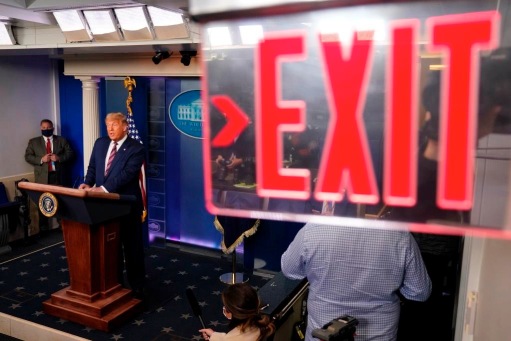
In his insurgent campaign in the 2016 Republican primaries, drawing on his celebrity status, ready name recognition, and his incendiary rhetoric, Trump had vanquished established standard-bearers and hijacked the party: the trade wars he launched went against the free market ideology long espoused by the Republicans; he questioned alliances—most notably NATO—that had formed the bedrock of a bipartisan foreign policy; and he encouraged a rabid white economic nationalism. But he also swore steadfastly to maintain the Republican Party’s counter-Robin Hood ideology—to rob from the poor and give to the rich—as it had changed from a bloc of diverse interests into a radical faction built around a single idea: winning absolute power and making America a one-party state ruled by people dedicated to tax cuts for the wealthy and stacking the federal courts with judges who would roll back the New Deal/civil rights-era social contract.
Trump’s willingness to say the unpleasant things that politicians are schooled not to utter in public—his racist demagoguery against immigrants, his lambasting of trade agreements, his unflinching support to bigoted white supremacists, his gratuitous insults to long-standing European allies, his flagrant disregard for international agreements—all served to energize a ‘base’ of support to Republicans, evident by the poll numbers in 2020. This included a withdrawal from the Paris Climate Accord, the Joint Comprehensive Plan of Action on nuclear weapons with Iran, and the North American Free Trade Agreement (NAFTA), the burial of the two-state solution to the Israeli occupation of Palestine, and the repatriation of US troops from Afghanistan and the Middle East. None of this would have been possible if an establishment Republican had been elected. Yet, the re-negotiation of NAFTA was replaced quickly with an arrangement that was beneficial not only to blue-collar workers in the United States but even for Mexican factory workers who now enjoy an hourly wage considerably greater than before. This surely played a role in Trump reducing Joe Biden’s margin in a Texas border county by 55 per cent where 95 percent of the population was Hispanic and the median income was only $17,000.

Despite Trump’s campaign promises to rebuild the country’s decaying infrastructure, raise the minimum wage, replace the Affordable Care Act with something better—Republicans in Congress would countenance none of this.
Whether Ted Cruz, Marco Rubio, or Jeb Bush had been the successful Republican nominee instead of Trump—they too would have enacted the sweeping tax cuts favoring the rich and the appointment of conservative judges to the federal and Supreme courts with the active connivance of the Republican majority in the United States Senate. What Trump did, and what none of the others could do, was to fire up the base of the Republican party, But once he had done that, there was no reason for the Republican establishment to kowtow to Trump. And Trump had neither the intelligence, the political nous, or competent advisors to see the importance of the Covid relief package blocked by McConnell and the Senate Republicans. Once he had done what the Republicans needed him to do, he was simply expendable especially when his Democratic challenger was Biden.
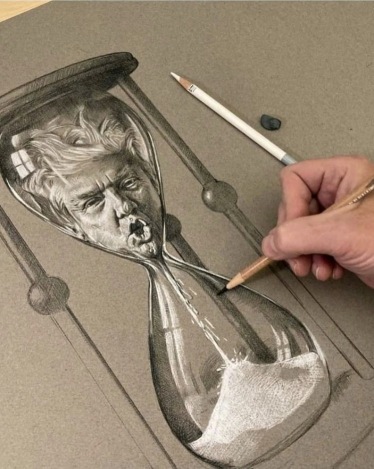
Trump’s removal as President would eliminate the one person who had unified the rival factions of Democrats and knowing how Trump loathes the idea of being a “loser,” McConnell the wily strategist could count on the President refusing to concede the election and thus firing up his ‘base’ for any down-ticket races that went to a run-off: most notably the two Senate seats up for grabs in Georgia which would decide the control of the Senate.
Moreover, Biden, after all, is the Republican face of the Democratic Party: the standard bearer of the “third way” New Democrats. He tragically assumes that he could ‘heal’ a nation that the Republicans dont want to heal; his memory of a deliberative Senate with goodwill on both sides has long been an anachronism—does anyone now remember Vice-President Dick Cheney telling Senator Leahy to “go f_ck yourself”? Early in the campaign, Biden had promised a group of wealthy donors that “No one’s standard of living will change, nothing would fundamentally change”!
Indeed, soon after the elections, the so-called “moderate” (in reality Republicans in Democratic clothing) Democrats claimed that progressive measures had led them to lose seats in the House of Representatives: Even though a majority of the voters favored a government-run medical insurance plan according to a Fox News survey, the Democratic Whip, Representative James Clyburn, argued that if Democrats campaigned on ‘socialized medicine and defunding the police,’ the party is not going to win elections!
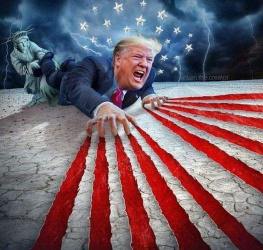
This starkly silhouettes the problem: Democrats won because of grassroots efforts to turn out Black and working class voters yet the party establishment—Biden and the party leaderships in both houses of Congress—are firmly on the side of the technocrats and financiers. Bankrolled by the financiers that the Obama administration had rescued from the financial crisis of 2005, Biden and the Democratic establishment cannot understand the plight of blue collar workers. After losing the old industrial belt, Hillary Clinton was to boast that she won “the places that represent two-thirds of America’s gross domestic product,..the places that are optimistic, diverse, dynamic, moving forward.” In 2020, Biden too won the 490 counties that represent 70 percent of the country’s GNP, but Trump won the 2,534 counties that account for a shade less than 30 percent of GNP.
This has produced a strange correlation of forces in US politics: the Republicans rail against the elites and even dare cast themselves as the party of the working class while the so-called party of the Left, mollycoddles the elite! If the economic impact of Covid-19 brought down Trump, unless the Democrats change fundamentally, we will get another populist demagogue, perhaps much worse than Trump—as in India, Narendra Damodardas Modi followed Atal Behari Vajpayee.
Coronavirus and Autocratic Resurgence
April 1, 2020 at 11:40 am | Posted in Uncategorized | Leave a commentTags: 21st Century Capitalism, Belgium, Bolivia, Brazil, China, democracy, Eastern Europe, France, India, Israel, Jordan, Philippines, Poland, Political Economy, Serbia, Thailand, Turkey, U.S. Politics, United Kingdom, United States
One of the less discussed outcomes of the coronavirus pandemic has been the astonishing rollback of democratic rights all over the world.‘Stay at home’ decrees and commandments to maintain physical distances have allowed governments everywhere, even in long-established democracies, to suspend constitutionally guaranteed personal freedoms including the rights of assembly and free movement, the right to demonstrate against governments and other entities, and to allow intrusive surveillance. Justified in the name of public safety, even if some of these powers are rescinded once the pandemic ebbs, the data collected could be used by governments (and private companies like Zoom and Facebook) to monitor citizens with little or no public scrutiny.
A random sample of governments amassing power by exploiting the fear of widespread contagion and extensive fatalities includes the following: Last Monday, Hungary’s parliament controlled by his Fidesz party greenlighted a rule by decree by Prime Minister Viktor Orbán as long as a state of emergency lasts. Serbian President Aleksander Vučić also assumed autocratic powers in an open-ended emergency by the suspension of its parliament, the imposition of a 12-hour curfew to be enforced by the police, the closure of borders, and barring those over 65 years of age from leaving their homes. In Poland, the ruling Law and Justice Party under Jarosław Kaczyński which had already made the judiciary subordinate to the executive, used the pandemic to compel people in home quarantine to install a government smart phone application to track their movements.
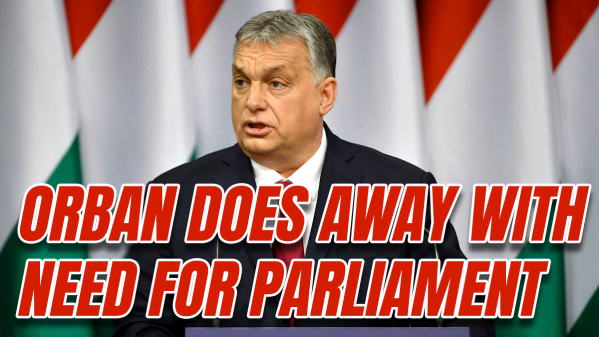
The Belgian Prime Minister Sophie Wilmes’ cabinet similarly obtained rights to govern by decree without parliamentary scrutiny for six months. In Israel, when Prime Minister Benjamin Netanyahu had failed to win a majority after three elections and his rival Benny Gantz had been invited to form a government, he exploited his rival’s political inexperience to make him accept a junior position in a Likud-led government. Netanyahu also secured legislative authorization to use a trove of cellphone data to surveil Israeli citizens and to delay court actions, postponing his own trial on corruption charges. Philippine President Rodrigo Duterte, who once referred to the country’s constitution as “a scrap of toilet paper,” has also engrossed emergency powers as has the Thai prime minister, Prayuth chan-ocha while the military police now occupy public squares in Chile. The Jordanian prime minister, Omar Razzaz, also acquired powers to censor news media and additional authority to detain people.
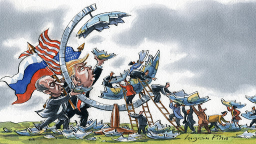
French lawmakers increased the powers of Prime Minister Édouard Philippe to rule by decree and to requisition goods and services for the medical emergency. And in Britain, the parliament conferred what has been described as “eye-watering” powers on the government to detain people and close borders. India’s Narendra Modi who had already placed Kashmir under lockdown for more than half a year now put the whole country under lockdown with only 4 hours’ notice!
Even before the pandemic had emerged, Republicans in United States Senate had humiliatingly prostrated themselves before President Donald Trump and conducted a farcical impeachment trial; Turkey’s President Recep Tayyip Erdogan had used a shoddy coup attempt to crush all dissent; Brazil’s Jair Bolsonaro had dismissed the participatory councils that have had a long history in the country and Bolivia’s president, Evo Morales had been removed from office in a coup.
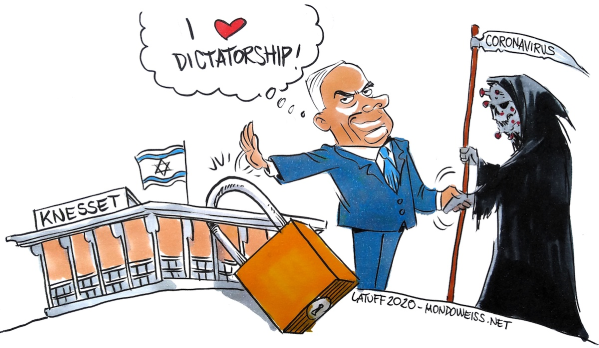
These breaches in the democratic fabric across the world had been so pronounced, even before the current transgressions, that one of the most discussed books in recent years has been David Ziblatt and Steven Levitsky’s How Democracies Die. Elected autocrats, they argued subvert institutions like the judiciary and the press; coopt important cultural and sports icons or malign and seek to sideline those who resist; disregard mutual tolerance; and violate the law. These are the playbooks of Trump, Modi, Duterte, Kacyński, Erdogan, Orbán, Bolsanaro, and Jeanine Añez who usurped power in Bolivia.
Yet, as Jill Lepore, wrote in the New Yorker magazine, in the years after the First World War, a war fought “to make the world safe for democracy” as U.S. President Woodrow Wilson famously put it, there was a similar collapse of democracies. Then too, after the breakup of the Austro-Hungarian, German, and Ottoman empires, there had been a brief florescence of democracies: but these soon withered away in Hungary, Albania, Poland, Lithuania, and Yugoslavia, to be followed by Greece, Romania, Estonia, and Latvia and more significantly by Portugal, Uruguay, Spain, Italy, and Germany.
In the 1980s democracy had replaced dictatorships in much of Latin America, the Philippines, and South Korea. And in the 1990s after the collapse of the Soviet Union, in Eastern Europe. Indeed, in 1992, Francis Fukuyama had written a prominent treatise The End of History and the Last Man, celebrating the final triumph of “Western liberal democracy.” Yet, within a quarter century, democracy is once again in question.
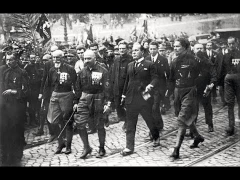
A study by the University of Cambridge’s Centre for the Future of Democracy, based on 25 international surveys covering 4 million people based 154 countries, concludes that 2019 “represents the highest level of democratic discontent on record” since 1995. Some 58 percent registered their disapproval with democracy in 2019 compared to 48 percent in 1995—with the drop in support especially marked in Austria, Brazil, France, Greece, Japan, Mexico, Spain, the United Kingdom and the United States.
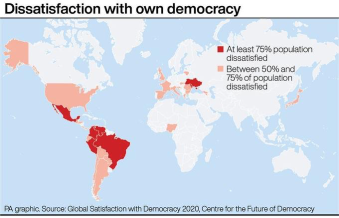
Yet, despite similarities between these two cycles of democratic crises, there are three important differences. Immediately after the First World War, the new democracies that arose were all in Europe or in its settler colonies in the Americas. Democracies established in the Global South after the Second World War were always more fragile as processes like territorial integration, adult suffrage, economic well-being and provision of welfare that took decades if not centuries to be instituted in Western Europe and North America and were accomplished sequentially, were telescoped into a few years in newly independent countries and were expected to be instituted simultaneously in conditions of extreme material deprivation, mass illiteracy, and constant interference by their former colonial powers, and by the United States and the Soviet Union.
Second, even though the Great Depression had weakened trade unions at the time of the rise of fascism in Europe in the 1920s and 1930s, the form of industrialization adopted by the New Deal in the United States, the welfare state in Western European high-income states, and eventually, post-war reconstruction strengthened the industrial working class which formed a bulwark against the return of authoritarianism. Today, the fragmentation of production processes and their outsourcing to low-wage locations have decapitated trade unions in most countries. Though the conservative parties initiated de-regulation in the 1980s and 1990s, it was the social democrats—Bill Clinton in the US, Tony Blair’s NewLabour in the UK, Francois Mitterand in France—who were the greatest champions of neo-liberalism and finance capital.

Blaming globalization for the loss of jobs and incomes, the working class—abandoned by social democratic parties—fell prey to the politicians on the right who preached xenophobia and nationalism. Donald Trump’s “make America great again” promised a return to a mythical past to a historically advantaged white working class. Similarly, the Conservative Party’s Brexit campaign demolished Labour’s “Red Wall” in the north of England by blaming migrants and the European Union for economic decline. To cover up the economic failings of his government, Narendra Modi targets Muslims and domestic opponents in India. As the Canadian socialist politician, the late Tommy Douglas, said: “Fascism begins the moment a ruling class, fearing the people may use their political democracy to gain economic democracy, begins to destroy political democracy in order to retain its power of exploitation and special privilege.”
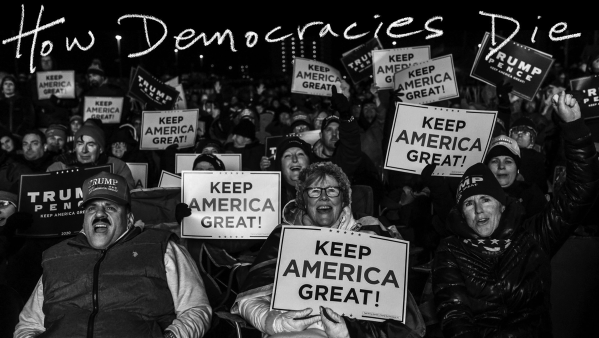
Though the blaming of foreigners and domestic minorities have garnered large constituencies of support for authoritarian rulers, their policies have consistently favored the rich by tax cuts, privatizations, de-regulations, dismantling environmental controls and the protection of indigenous peoples. They have been able to subordinate the judiciary by nominating judges and to muzzle the press with varying degrees of success.
In March 2020, Prime Minister Modi nominated Ranjan Gogoi, the just retired Chief Justice of the Supreme Court of India who had rendered crucial verdicts in support of the ruling BJP, to a seat in the Upper House of Parliament, the Rajya Sabha. Modi has also coopted sport and cultural icons: in the cricket-mad country, Virat Kohli, the captain of its national team, called the prime minister’s demonetization of ₹500 and ₹1000 notes in 2016 as “the greatest move in the history of Indian politics,” despite its drastic economic consequences. In the case of Poland and India, it was only after the ruling parties won a second election that it surged ahead with their repressive agendas.
The emergency initiated by the Covid-19 pandemic has licensed further restrictions on the freedom of the press. Governments in many countries have banned the spread of ‘fake news’ deliberately leaving definitions vague and ambiguous.
Third, strangely, it is in fact the very global networks that are castigated for a decline in living standards that make life bearable for the poor: without the cheap smartphones and computers assembled by low-waged workers in China, Uber and Lyft, Zomato and Ola in India, could not exist to create a “gig” economy. Without the cheap imports from China and other low-wage economies, the poor in the West can hardly fulfill their credit-card driven consumer spending, itself a result of low- and middle-income countries purchasing US Treasury bonds to keep the value of their currencies low.

Once the strength of the trade unions was eroded, opposition to authoritarianism has come from the middle classes—ironically derided as the “elite” by Donald Trump and his allies in the United States, as the ‘Khan market gang’ and the “tukde tukde gang” by Modi and his supporters in India, as “Gullenists” or the “PKK” (Kurdish Workers Party) by Erdogan. In many cases, they have failed to reach out adequately to the poor, especially ethnic minorities. In India at least, the passage of the Constitutional Amendment Act which offers citizenship to all illegal immigrants from neighboring countries except Muslims—and one which cricket captain Kohli stubbornly refused to condemn—and the attacks on universities have mobilized the youth and a wider social strata against the government.

It is this upsurge that the new round of autocratic resurgence is trying to corral. Nine years ago, the Arab Spring may have been celebrated as a social media and Internet-sparked revolution but not only did it collapse but it also showed that the middle classes are easily surveilled by the ubiquity of mobile phones and wifi-connected cameras. Governments now have used the pandemic as an excuse to legally tap this trove of electronic data to keep an eye on its citizens.Even if these powers are rescinded after the pandemic is over, data collected could be mined to obtain granular details about the citizenry, their opinions, connections, and predilections!

And of course, policing is always deployed as a disciplinary weapon against racial and ethnic minorities and the poor. In the United States, President Trump’s reference to the virus as “Chinese virus” and U.S. State Department’s attempt to call it the “Wuhan virus” in a G7 communique have led to heightened attacks against Asian Americans. In India, people from the northeastern states have similarly been subject to racist attacks.
‘Stay at home’ orders may subject the middle classes to electronic surveillance but the poor have to put their lives on the line and go to work.Reports of police brutality against workers delivering essential goods in India is a reflection both of their lack of information and their general disdain for manual laborers. Even worse, the sudden lockdown of the country forced millions of migrant workers to walk back to their villages in complete disregard for their lives as all public transport was grounded and private taxis were out of reach. The sheer mindlessness of the order when maintaining physical distancing is impossible for the poor in densely populated countries is not only self-evident but also not essential when people over 65 are most vulnerable and 94 percent of the population is below that age!
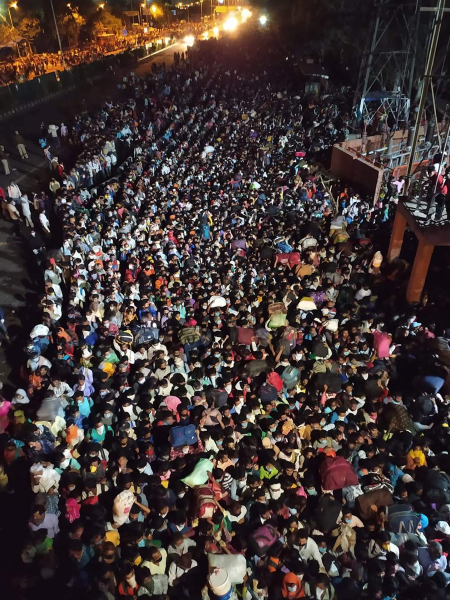
Over the long-term, opposition to authoritarianism will pivot around how the Left can formulate a strategy that enables an increasingly atomized poor to reverse their exploitation in conditions where automation and artificial intelligence deprive them not only of well-remunerated jobs but also of opportunities to combine together. Given the world-spanning production and procurement networks, such a strategy will have to be based on a progressive internationalism, all the more compelling because of the continuing destruction of the environment wrought by capitalist neo-liberalism. We need, in short, new strategies to fight authoritarianism in the twenty-first century.
Coronavirus and the World-Economy: The Old is Dead, the New Can’t be Born
March 27, 2020 at 1:31 pm | Posted in Uncategorized | Leave a commentTags: 21st Century Capitalism, Bangladesh, Brazil, Britain, Central Asia, China, climate change, Cold War, Cuba, Denmark, Eastern Europe, Europe, Germany, Hegemony, India, Italy, Mexico, South Africa, U.S. Politics, United States, World-economy
“The crisis consists precisely in the fact that the old is dying and the new cannot be born; in this interregnum a variety of morbid symptoms appear.”
– Antonio Gramsci, Selections from Prison Notebooks.
The novel coronavirus pandemic has struck the world-economy in a way no other crisis had done before. Earlier pandemics—like the Spanish flu of 1918—struck a world which was far less integrated than today and supply-chains did not then span the planet. Nor was there then the volume of long-distance travel that could transport the virus all over. Since the SARS epidemic in 2002, airline data indicates that air traffic from China alone has increased ten-fold. The Great Depression of 1929-33 settled in over time: now, as countries close their borders and order all non-essential businesses to shutter their stores and offices, economic activity has ground to a halt without parallel. At that time, manufacturing commanded a large share of the economic output, and inventories that piled up could be sold as conditions eased up. Today, services account for the bulk of economic activity and a haircut, an Uber ride, or a dinner at a restaurant foregone cannot be made up. The global financial crisis of 2008-09 may have plunged economies on both sides of the North Atlantic into a recession but not China, India, Brazil and other ‘emerging market economies.’ This time it is different: it affects the entire planet even though its impact is conditioned by how this virus mutates and scythes through populations with different immunities and age, class, gender, and ethnic compositions.

The very distinctiveness of the current situation makes past experience a poor guide even though past experiences can provide some clues. Social distancing as a means to mitigate the spread of the virus will have little effect in densely populated, low-income states. The last major pandemic was the Spanish flu of 1918 which may have come out of Kansas and is estimated to have killed 1 to 2 percent of the world population. But its impact across the world varied widely: 60 percent of its fatalities came from western India where a major drought did not prevent grain exports to Britain and the more malnourished population was more vulnerable.

The greater vulnerability of the poor to the novel coronavirus, Covid-19, will tragically be repeated once again. Social distancing as a means to mitigate its spread will have little effect in densely populated, low-income states. How do people in slums or informal settlements practice what is misleadingly called social (rather than physical) distancing? In Johannesburg’s Alexandria township, 700,000 people live on 1.9 square miles; the same number of people are crowded into Dharavi’s 0.81 square miles in Mumbai; and Rio de Janeiro’s Rocinha is as large as Dharavi but with only 200,000 people. Daily laborers, and people who sell used clothing or vegetables don’t have the luxury of working from home. Nor do people in slums and favelas have easy access to clean water to practice the hygiene recommended to prevent contagion.

Ethnic and racial minorities in wealthier countries are also less able to practice physical distancing. A study by the Economic Policy Institute in Washington, D.C., found that less that 30 percent of the people in the United States have jobs that can be done from home in 2018. Even if new telework technologies like online schooling are included, only 16.2 percent of Hispanic workers and 19.7 percent of African Americans are able to work from home compared to 30 percent of Whites and 37 percent of Asian Americans.
Taxi owners in New York city who took out large loans to buy the medallions to drive yellow cabs are facing ruin as air traffic virtually ceases and the city shuts down. People supplying essential commodities—fruits, vegetables, and other agricultural products—have no option than to work if they are to feed themselves and their families. And in the United States, they and the workers in abattoirs are poorly-paid migrants.

It should be blindingly obvious that policies implemented in wealthier North American and European countries cannot be blithely applied in the Global South—and yet that is precisely what the Narendra Modi government has done in India. It imposed a virtual ban on movement within the country for 21 days with just 4 hours’ notice—leaving migrant workers stranded and making no provision for wages in a country where upwards of 90 percent of the working population are in the informal sector and the density of population is almost 400 per square mile. Conversely, Jair Bolsonaro of Brazil and Andrés Manuel López Obrador of Mexico have dismissed the pandemic as a minor aberration.

Low income countries also do not have the infrastructure to deal with a major pandemic: Bangladesh has 170 million people but only 500 ICU beds. The worst affected country in Europe, Italy, has only 4 doctors per 1000 people; India has less than 1 and other countries fare even worse. Populations of low income states are also more vulnerable to environmental pollution which reduces their immunities. One third of coronary respiratory diseases in the world in 2018 were in India which also has the largest number of tuberculosis patients in the world—and the latter are especially at risk for Covid-19. One estimate suggests that 300 million Indians could be infected by the virus by July and fatalities could be anywhere from 2 to 3.5 million.
Much of the clothing sold by big brand name corporations in the Global North are made by workers in China, Bangladesh, Laos, Cambodia, and elsewhere. With lockdowns being imposed in Europe and North America, companies are cancelling orders and since manufacturers are only paid once their products are shipped while they have to pay their workers and material suppliers beforehand, they are now stuck with large inventories of clothes that have shelf-lives determined by the season. Their governments do not have the ability to bail out manufacturers in the ways contemplated by governments in high-income states. Unlike the United States, they cannot simply print more currency, especially when the currencies of states in the Global South are plunging relative to the dollar: the Indian rupee is now at a historic low as is the South African rand to take just two examples. It is clear, then, that the impact of the virus will be felt disproportionately by the poor, especially in low income countries.

If the disproportionate impact on the poor is similar to prior pandemics and crises, it is not at all clear how the world-economy will emerge out of it. Responding to the collapse of stock markets, governments are pumping money into the economy but when people are ordered to stay home, the circulation of money slows down as well—especially for small businesses. The Amazons and the Walmarts may advertise for tens of thousands of more workers, but that will barely make a dent in the number of employees shed by small businesses.
Broadening our aperture, the scale and suddenness of economic and social disruption is such that there can be no return to the pre-pandemic situation. Supply-chains within and between states have been severed, perhaps irretrievably. The range and severity of these disruptions would depend on how the Covid-19 impacts populations—depending on the virus’ mutations and age, class, ethnic, and gender distributions of specific population groups with their different disease experience and immunities. Given the expansion of robotics and numerically-controlled machines, the ongoing disruption of supply chains may well lead to a further replacement of workers by these technologies, especially if the virus scythes through low-income economies disparately.
Again, while the stock market collapse and the rise of unemployment may recall the Great Depression, conditions today are very different. During the 1920s and 1930s, the industrial working class was a key component of the recovery. Solidarities formed in factories and mines were the basis of organizing against deprivation—to the New Deal in the United States and to the beginning of the modern welfare state in Europe. Widespread de-industrialization and the destruction of unions in the contemporary world have cut the ground from under the trade unions. In these conditions, as the electoral appeals of Trump, Boris Johnson, Matteo Salvini and others indicate, the atomized successors to historically advantaged middle and working classes have turned against ethnic minorities and migrants; against globalization and towards a reactionary nationalism. This is true not only in Europe and North America but even in South Africa where migrants from other African states face xenophobic attacks.

Keynesian policies adopted in the Great Depression to increase demand did reduce unemployment but not by nearly enough: in the US, it fell from a peak of 25% in early 1933 to 14% in 1940. It was the Second World War which transformed the US into the breadbasket and factory for the Allied war effort and military mobilization which eventually solved it. And after the hostilities, when de-mobilization raised the prospect of surging unemployment again, Pax Americana led to a new burst of economic prosperity that lasted for a little over two decades—the ‘Golden Age of Capitalism.’
The Cold War was the essential component of this age: military mobilization and aid to European allies, and domestically a pact between Big Government, Big Business, and Big Labor led to an era of consumerism at home and abroad; the Soviet Union which assumed responsibility to maintain the peace from East Germany to the 38th parallel similarly implemented relatively successful reconstruction in its zone; and independence brought modest rewards to former colonies in Asia, the Middle East, Africa, the Caribbean and elsewhere.
Today, the United States exercises no intellectual leadership: indeed, its president with, what Peter Baker and Maggie Haberman characterized in the New York Times as, his “profound need for personal praise, the propensity to blame others, the lack of human empathy, the disregard for expertise, the distortion of facts, the impatience with scrutiny or criticism” has proved singularly inadequate to the task. His attempts to buy exclusive rights to a vaccine being developed by Curevac, a German company funded by the German government has offended and exasperated not only the Germans but all thinking citizens everywhere. This is hardly the type of leadership one expects from the leading power. Even worse, the US prevented a G7 declaration on the virus because of the Trump Administration’s insistence on calling it the ‘Wuhan virus’ instead of the ‘coronavirus’!

In contrast, China is stepping up to aid countries: sending doctors and medical supplies to countries from Peru to the Philippines, Japan to Spain. Cuba is dispatching its doctors to Europe and elsewhere. The United States, after having failed to secure exclusive rights to a potential vaccine, is now scouring Eastern Europe and Central Asia for medical supplies and refusing to implement its Defense Production Act to compel its domestic industries to produce these vital goods in a critical time. Rather that demonstrating leadership, seeking to procure essential medical supplies from these poorer states harkens back to Britain’s policies of requisitioning food from its colonies even when they were suffering droughts.
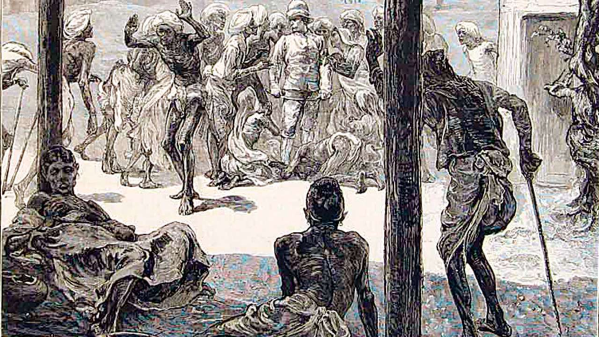
Meanwhile, Trump’s allies in the U.S. Congress are pushing through a bill to provide about $1,200 dollars (for those with an annual salary of $75,000 or less) and $500 per child: not even enough for a month’s rent in a major metropolitan center. Strong opposition from Democrats overcame objections to increase some contributions to the poor like extending unemployment benefits but these still remain very inadequate and short term. In contrast, the government of Denmark is guaranteeing 75 percent of salaries (upto $3288 a month) of those with annual salaries of $52,400: amounting to almost 13 percent of GDP. It is the provision of cash to the employees and workers whose spending generates multiplier effects that can at least partially revive economies though that also depends on how supply chains are reconstituted.

The Democratic Party seems equally rudderless. Its presumptive presidential nominee, former Vice-President Joseph Biden has hunkered down at his home and has not been seen making policy statements. Though the Democrat-controlled House of Representatives passed an early bill, it didn’t address fundamental problems and they are now likely to adopt the Senate version of the stimulus package, with minor revisions at best. Given the urgency of the situation and the strength of industry lobbies, much of the relief will in any case go to companies that have long avoided taxes including cruise lines that fly the flags of other nations than to the lower classes and to ethnic and racial minorities in the country.
The Second World War and the Cold War reconstituted the world-economy on a new basis because the concentration of economic and political power in the United States enabled it to exercise intellectual leadership when most other industrial economies had been devastated, hegemony in the Gramscian sense. The United States no longer has a similar dominance. Nor does any other state or group of states.
What the pandemic makes clear though is that we need a fundamental change in institutional structures of the world-economy. Wealth inequality has escalated everywhere in the world and is no longer sustainable. The emergence of a precariat, now subject to extraordinary deprivations by the shutdown of economic activities, is not the result of the pandemic or of low oil prices. State institutions have become increasingly privatized. Distinctions between center-right and center-left parties have been erased and neither one shows any inclination to compel Big Pharma to invest in research to preserve public health and prevent the spread of infectious diseases. Indeed, fifteen of the eighteen major pharmaceutical companies have stopped research on antibiotics and antivirals to focus in medicines that generate large profits: to treat male impotence, addiction from tranquilizers, and heart disease. Viruses jump more easily from animals to humans as nature is being destroyed and as cheap meat is dependent on factory farming which also has disastrous ecological consequences. It is imperative to reduce meat consumption..

How we address these issues—and the issue of global warming and climate change—will be key to a new, sustainable, and more equitable pattern of life. With the old dying, and the new being unable to be born, we are condemned to an unstable and volatile future.
Delusions about a “New Kashmir”
August 15, 2019 at 1:18 pm | Posted in Uncategorized | Leave a commentTags: colonialism, democracy, India, Kashmir, Pakistan, terrorism
Last Thursday, 8 August 2019, Indian Prime Minister Narendra Modi spoke to the nation justifying his government’s decision to end the ‘special status’ accorded to India’s only Muslim majority state, Jammu and Kashmir, and indeed to dismantle it as a state and make it into two Bantustans—Jammu & Kashmir with a legislature shorn of several important powers, especially with regard to law and order and land which will be controlled by the federal government; and Ladakh which would be ruled directly from New Delhi with no pretence of democratic accountability to its residents. In particular, the new regulations struck down a provision in the Indian Constitution—Article 35A—which restricted the purchase of land in Jammu & Kashmir to those whom its legislature classified as permanent residents. This provision, Prime Minister Modi said would lead to a new Kashmir, a naya Kashmir, which would become prosperous due to the possibilities open to investment: a reintegration with economic benefits
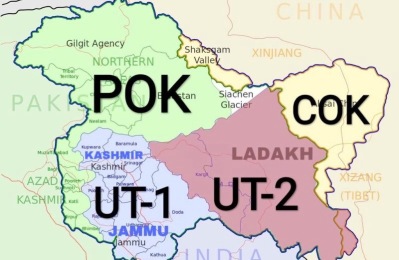
These measures were widely popular in much of the rest of India—with people bursting crackers, a routine practice of celebration, vowing to buy land there, even leading to the creation of a whole sub-genre of songs: and, with some in Haryana and other states, known for female foeticide and infanticide, fantasying bringing “white” Kashmiri brides!
In an unmistakeable parallel with the “white man’s burden,” Nirupama Rao, a former Foreign Secretary, wrote that in the Times of India that Kashmir was economically 200 years behind the rest of India—a claim that is patently untrue!

On a variety of socio-economic indicators, Kashmir fares better than the average for India: Jammu & Kashmir’s infant mortality rate (children under the age of one) per 1000 is 23; for India as a whole it is 33; Life expectancy at birth is 73.5 in Jammu and Kashmir, 68.7 is the India average; the poverty rate is 10.4 in J&K but 21.9 is the India average; the sex ratio at birth is 917 in J&K and only 896 in all of India, to take just a few indicators. Yet, Rao claimed:
Most importantly, the views of the Kashmiris were never sought. But let us examine the proposition whether the new measures would in fact bring about prosperity. The claim is based on the proposition that the removal on restrictions on the purchase of land would lead to a spurt in investment in tourism and even movie-maklng. Contrary to popular belief, this was a law introduced in Kashmir by its Hindu maharaja in the 1927 to quell fears among Hindus in Kashmir that outsiders—Punjabis, Europeans, others—would buy land in the idyllic valley. It was not directed against the Muslims who were too oppressed to be a threat to the Hindus at that time, though since 1947 Muslims have also come to see the value of this law. Similar laws exist in a number of border states of the country—Himachal Pradesh, Assam, Arunachal Pradesh. Nagaland, Manipur, and Tripura. It is this law, as Pallavi Aiyer argued in the Hindu newspaper, that shielded the people of Kashmir from “demographic engineering like the large-scale Han migration into Tibet and Xinjiang.” Indeed, after the decision to downgrade Jammu & Kashmir to a Union Territory, the local leader of the Bharatiya Janata Party (BJP) himself is on record saying that restrictions must be placed on outsiders buying land.
Restrictions on private individuals buying land in Kashmir, as a former state finance minister, Haseeb Drabu underlined in a television interview, did not prohibit corporations from taking land on extendable 90-year leases as the major hotel chains have done and the Birlas who set up a textile mill. Restrictions on land ownership also does not apply to the Indian government and its public sector undertakings which employ 1 million people in the country but only 21 in Kashmir. Border states depend heavily on the central government for investments, especially in infrastructure: and of that there has been precious little in Kashmir, Indeed, given the continued level of militancy, there is little reason to hope that these actions which have humiliated and outraged Kashmiris will lead to greater levels of investment.

And the state is seething with resentment: Kashmir has been under a communications lockdown for 10 days—no Internet connections (meaning also no credit or debit card transactions), no mobile phones or landlines, no cable TV and most newspapers closed—with a tight curfew. By some estimates, there is one military or paramilitary personnel per 10 persons in the Kashmir Valley! Political leaders in the state who had cooperated with the Indian government have been imprisoned and having been humiliated, they cannot now accept the terms imposed on them. The state police force, which had been on the frontlines of the war against militancy, have been disarmed. There is now no local interlocutor for the Indian government
As Mohamad Junaid wrote:
Without regard for its people,
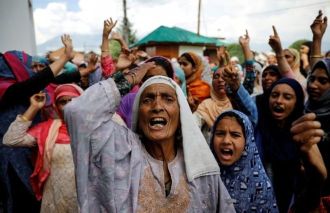
It becomes in short, India’s West Bank: a place for settlers to move in armed convoys and occupy another people’s land (and Google searches for “land rates” and “plots of land” in Kashmir spiked soon after its special status was revoked). Kashmiris will be turned into Palestinians—“aliens, stone pelters, terrorist, who need to be disciplned.”The Modi-Shah plan to “integrate” Kashmir looks perilously close to Jared Kushner’s plan for investment with independence in the West Bank!
Darkness at Noon: Kashmir and the Unraveling of Indian Democracy
August 8, 2019 at 2:33 pm | Posted in Uncategorized | Leave a commentTags: democracy, India, Kashmir, Pakistan, terrorism
Fresh from winning a huge mandate from the largest electoral exercise in history, the Narendra Modi government has just hammered the largest nail in the coffin of Indian democracy. Flooding the state of Jammu and Kashmir with over 35,000 additional troops, detaining its political leaders, severing landlines and internet and mobile phone connections, and imposing a state-wide curfew, the Indian Home Minister, Amit Shah, moved to end the state’s special constitutional status, and demoted its status from that of a state to the lesser-status of a union territory while bifurcating it as well. While the removal of Kashmir’s special constitutional status has dominated the headlines, it is the state’s demotion that is the more consequential.
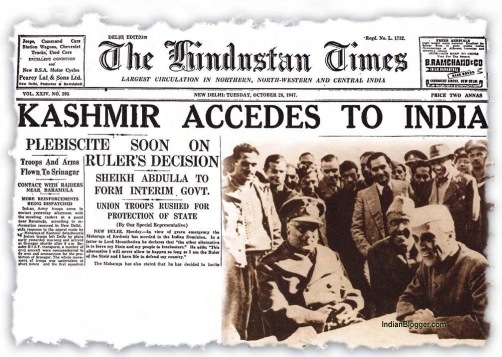
Article 370 of the Indian constitution had granted Jammu and Kashmir exemptions from the Indian Constitution and laws passed by the Indian Parliament except in the matters of defense, foreign affairs, and communications unless the state’s constituent assembly consented to these laws and constitutional provisions. Alone among the states of the country, Jammu and Kashmir had its own constitution and flag. This was the codification of the terms under which the state entered the Indian Union in October 1947 when it was faced with an invasion of tribesmen led by Pakistani officers. The Instrument of Accession, which has the status of a treaty between two sovereign states, had stipulated that provisions of the future constitution of India be applicable to the state only after these provisions had been accepted by the state’s own Constituent Assembly. In effect, this largely meant that the state had special autonomy not granted to other states especially that while the national Parliament “had exclusive powers to make laws pertaining to States, on all matters not in the State and Concurrent Lists, the residuary power rested with the State legislature in the case of J&K.” Such special status is not exceptional to India—Hong Kong and Macau, for instance, have a special status in China. In India too, other states like Nagaland also enjoy constitutional protection from the application of laws passed by Parliament in regards to their social and religious practices and to the administration of their civil and criminal jurisdiction as well as to the ownership of land by non-Nagas. This of course did not arouse the ire of the BJP as the Nagas were not Muslim!

Indeed, over the years, Kashmir’s special status has steadily been eroded by Presidential Orders. In 1954, with the concurrence of its government and constituent assembly, most of the provisions of the Indian Constitution were extended to the state. At that time, a reactionary article limiting the ability to buy land to permanent residents of the state and mandating that the children of Kashmiri women marrying non-permanent residents lose their rights, was inserted into the Indian Constitution as Article 35A (the Kashmir High Court struck down the provision that women marrying outsiders lose their permanent residency rights in 2002). Subsequently, over 40 such Presidential Orders were issued further hollowing out the special status of the state. The Indian Government even arrogated to itself the power to change the state’s constitution—changing the position of the governor from one elected by its legislature to a nominee of the president—a power not granted to it by Article 370. Ironically, it is this very change that has allowed the Modi government to abolish the state’s special status: as the state legislature is dissolved it claimed that the governor—a nominee of the Modi government—represents the state government and that he has concurred with the extension of all the provisions of the Indian constitution and laws to the state, thus avoiding the need for a constitutional amendment!

Nevertheless, Kashmir’s special status has long been a bugbear for the rest of India and the fact that Kashmiris can freely buy land in most of the country (except parts of the Northeast where similar laws regarding land ownership by outsiders apply) has rankled middle classes in the rest of India. No matter that for 10 of the last 45 years, Kashmir has been under direct rule by New Delhi, no matter that elections in Kashmir were regularly rigged, that its independence leader, Sheikh Abdullah was broken by years of imprisonment, no matter that in practice the special status meant that it enjoyed such dubious
the abolition of its special status is widely popular in the rest of India.
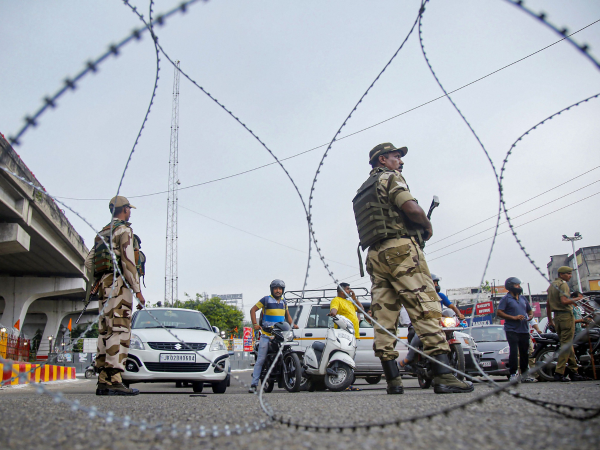
However, the stripping of Kashmir’s special status—hollowed out in practice though it may be—is an emotional issue for the people of the state. They woke up on August 6, 2019 in a place that was not only without its special status but was not even a state! As a union territory, the powers of the legislative body were substantially reduced: from having its elected head of state, Sadr-e-Riyasat, to a governor appointed by New Delhi, it now had only a Lt. Governor. Unlike states, union territories are administered directly by the Indian central government and even though the new union territory of Jammu and Kashmir has a legislature, its powers are significantly curtailed especially with regard to law and order and to land; the new union territory of Ladakh does not even have a legislature and would be directly administered by unelected bureaucrats.
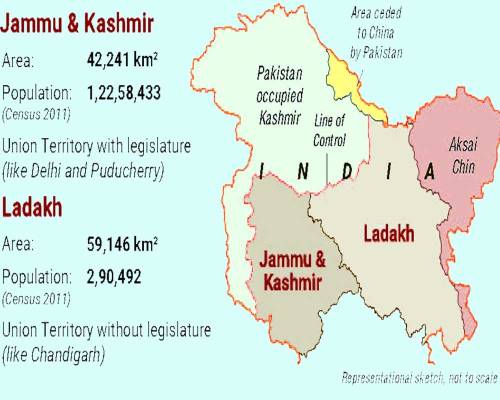
Never before in the history of India has a state been demoted to a union territory and this fundamentally calls into question the federal character of the Indian polity. It is this erosion of their democratic rights that led to the imposition of the type of
The arrest of political leaders who had been willing to cooperate with India, the shut down of the internet for the 53rd time this year, the imposition of curfew and the severance of all communication links within the state and between the state and the rest of India—even one-way forms of communications like cable TV—all point to the unpopularity of the moves in Kashmir. If democracy means anything, it means the consent of the governed, No matter how popular the Modi government’s elimination of Kashmir’s special status and its bifurcation into two union territories may be in the rest of India—except the Northeast where there are fears that they could be the next—it could only mean more disruption in Kashmir. Politicians who had been willing to cooperate with India can no longer do so as they would lose even the little credibility they had. It inevitably strengthens the hand of the hardlners. In these conditions if outsiders are allowed to buy land in Kashmir, security forces would have to protect them like the Israelis who settle in the West Bank.
Never before has India been as much an occupying power as now—and it is the right of the occupied to resist their subjugation!
Veni, Vedi, Vasectomy?
June 5, 2015 at 2:54 pm | Posted in Capitalism, democracy, Human Rights, international relations, Labor, Political Economy, Production, world politics | 1 CommentTags: Europe, European Union, Eurozone, France, Germany, Greece
On June 3, when the President of the European Commission (EC), Jean-Claude Juncker conveyed the collective demands of Greece’s creditors—the European Central Bank (ECB), the European Commission, and the International Monetary Fund—to the embattled country’s Prime Minister, Alexis Tsipras, a member of his governing Syriza party said of the Greek delegation: “They came, they saw, and they had their balls handed to them.”
Five months after the anti-austerity party rode to victory in the Greek elections and had renounced efforts by previous Greek governments to impose austerity measures that had led the country’s debt grow from 124 per cent of GDP to 180 per cent and its unemployment rate soar to 25 per cent (and youth unemployment to 60 per cent) and its pensioners see their meagre pensions decline even faster, the German Chancellor Angela Merkel invited the IMF’s Managing Director Christine Lagarde and the President of the ECB, Mario Draghi to a previously scheduled meeting between herself, Juncker, and the French President Francois Hollande on June 1 to draft a common negotiating position among Greece’s creditors. Prime Minister Tsipras was notably not invited.
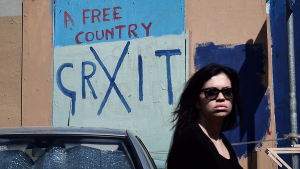
Papering over their differences, the 5-page demands Juncker delivered to Tsipras made some concessions to Greece—lowering the demand that the primary surplus for 2015 be 1 per cent rather than the 3-4 per cent that had been the earlier demand—but also included “red lines” that the Syriza-led government had vowed never to cross such as generating 2 per cent of the GDP from cutting pensions and raising VAT to a uniform level (except on food, medicines, and hotels), not to reverse the labor market reforms that the ‘troika’ (the ECB, the EC, and the IMF) had forced down the throats of previous governments, and even to establish an ‘independent’ tax and customs agency and thereby making its operations beyond the ambit of elected officials.
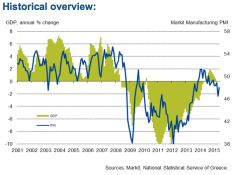
Yet, far beyond debates on primary surpluses and ‘red lines,’ the real struggle between Greece and its “European partners” is over politics. The positions are clear. Because of the single currency, an indebted country like Greece cannot devalue its currency and thereby cheapen its exports and with the increase in exports (and tourism) repay its debts. Hence the ‘troika’ (now renamed ‘the institutions’) were attempting to impose an ‘internal devaluation’ on Athens: forcing it to cut minimum wages and increase labor market ‘flexibility’ (making it easier to hire and fire workers and thereby also curb labor militancy) to force down the prices of Greek products to increase exports, to privatize government assets, improve taxation and efficiency in collecting taxes, and to sharply reduce government expenditures by severely cutting welfare programs and reducing public sector employment and pensions. Syriza and other opponents of the ‘austerity’ measures have argued that these measures actually impede Greece’s ability to repay its loans: if people don’t have money due to welfare cuts, job losses, etc., they cannot buy goods and hence more businesses fail. Indeed, Greece’s GDP has contracted by over 25 per cent in the five years of troika-mandated austerity and its unemployment remains high while its debt as a ratio of GDP has grown from 124 per cent to 180 per cent.
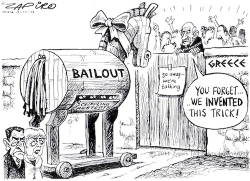
As Robert Preston, the BBC’s economics editor puts it:
But although for the pride of the creditors, the question of whether Greece is obliged to generate a surplus on its budget, excluding interest payments, of a bit more than zero or 3%, feels like a world of difference – it is a rounding error compared with the money Greece owes them, which is equivalent to 180% of Greek GDP.
In the highly unlikely event that Greece could generate a 2% or 3% surplus year-in and year-out without its economy shrinking further (which few economists would anticipate), it would take around half a century for Greek public sector debt to fall to a level regarded as sustainable. gett A half century of austerity? In what modern democracy would that be regarded as a realistic option?
Most egregiously, sharp cuts in expenditure has meant that in some hospitals budgets have fallen by 94 per cent. How can this be sustainable in a continent as rich as Europe?
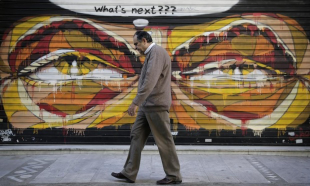
It is clear that one way or another, as Nils Pratley wrote in the Guardian, there will have to be a debt write-down. What Greece’s European “partners” are unwilling to countenance is Syriza’s demands to reverse the “austerity” measures because they want to root out any left-wing challenge to the reigning neo-liberal orthodoxy. Once Greece caves in, subjects itself to ‘vasectomy’ in the words of one of its MPs, then debt-relief could be offered but not before. To offer a write-down of the debt is particularly terrifying to Spain where the governing party has already lost many local elections to a Syriza-like party, Podemos, which now controls the three major cities of Madrid, Barcelona, and Valencia. It is also threatening to other EU economies like Portugal, Ireland, and Italy which have been compelled to implement austerity measures.
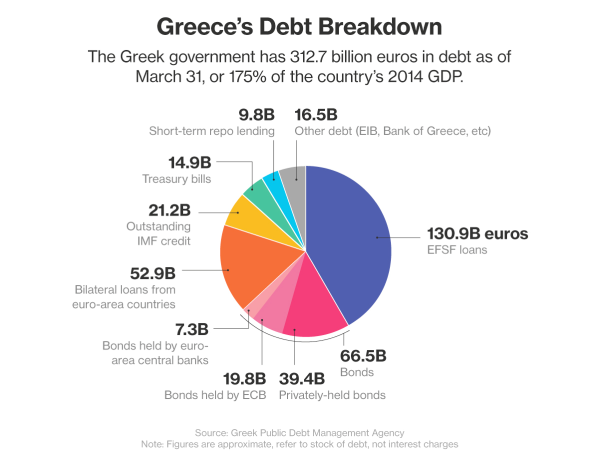
Syriza has, however, done its cause no favors despite some eloquent posturing by its Finance Minister, Yanis Varoufakis. It has not demanded a write down of the debt—and we must remember that when the troika made the first loan to Greece in 2010, Germany and France explicitly demanded that the austerity not be extended to the military—and Greece has been the best customer of the German arms industry. How is the cutting of pensions and salaries to workers while maintaining higher than the EU average in military spending morally justifiable?

With Syriza maintaining the charade of negotiating with its European ‘partners’ over the last months, Greece’s position has rapidly deteriorated as frightened depositors have withdrawn their money from the banks and even transferred them outside the country. By the end of April, Greece’s bank deposits were at their lowest level since 2004 and by the end of last week deposits were being withdrawn at the daily rate of 1 billion euros.
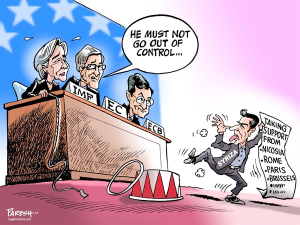
Interestingly, the Speaker of the Greek Parliament, Zoe Konstantopoulou, has set up a Debt Truth Committee to report to parliament on June 18
is said to be on the point of finding some of Greece’s original bailout debt, from either 2010 or 2011, was unlawfully contracted. In addition, Ms Konstantopoulou is armed with a finding from experts that Germany owes Greece €350bn in war reparations – more than the whole of its debt to Europe.
This could open up a host of legal challenges even if Tsipiras was to finally cave into the troika’s demands. The question is whether the Left Platform within Syriza is strong enough to prevent a cave in when there is nothing the troika would like than to install a government of national unity with a rump Syriza. That would, temporarily at least till Spain’s November election, decapitate the European Left. Will it happen?

In the short run, if no resolution is found, Greece will be unable to make scheduled payments to its creditors and being declared to be in default would make its borrowing costs in private capital markets intolerable; Syriza’s reluctance to impose capital controls would lead to the swift collapse of its banking sector unless the government begins to issue a virtual currency against future revenues which could ease the liquify crunch domestically at least. But Greece cannot be thrown out of the EU without its consent as all decisions must be unanimous. Even if Greece were to exit the common currency—Grexit as it has been dubbed—it would call the whole European project into question. It is also unrealistic to expect a country as bankrupt as Greece to police its borders when hordes of refugees from Africa and the Middle East are streaming to Europe—and from Greece, they could move to any country in the Schengen area. Will this be enough for its European ‘partners’ to blink?
Modi, An Indian Caesar? Or, How Not to Interpret the Indian Election Results
May 19, 2014 at 12:10 pm | Posted in Uncategorized | 1 CommentTags: Capitalism, democracy, India, Labor, world politics, World-economy
Narendra Damodardas Modi’s spectacular victory in the 16th Lok Sabha elections—the first time in 30 years that a single political party has gained a majority of seats—has been hailed as a “democratic asteroid” by Sunil Khilnani, presumably in reference to the asteroid that is said to have exterminated the dinosaurs. The venerable dinosaur of Indian politics, the Congress Party, has indeed been reduced to a cipher, gaining less seats all-India than Modi’s Bharatiya Janata Party (BJP) won in Uttar Pradesh alone. And Pratap Bhanu Mehta crowed “Modi is a political phenomenon without precedent”:
he presented himself as something new: to walk into Bihar and talk about transcending caste politics, to utter the sentence no secularist in India has had the courage to utter, that poverty has no religion, to dream of reviving India’s growth prospects, to talk about jobs, to tap into the restlessness for doing things. He became an embodiment for a desire for change.
Even critics of Modi for his failure to protect Muslims from a massacre in 2002 when he was chief minister of Gujarat, like Tunku Varadarajan, argue that “it is time to wipe his slate clean” as we must honor the choice of the electorate and stop harping on 2002 because:
the size of Modi’s majority, … would allow him to govern magnanimously, and with no vindictiveness toward those who did not vote for him. His parliamentary numbers allow him to enact economic reforms that Indians crave, with no need to buy off, or kowtow to, difficult coalition partners. They allow him, also, to extend a hand of reconciliation to India’s Muslims, who, at 11 percent of the population number just over 170 million people. Early analyses indicate that only 10 percent of Muslim voters cast their ballots for the BJP, although the party did win just over 40 percent of all seats with a significant Muslim population.
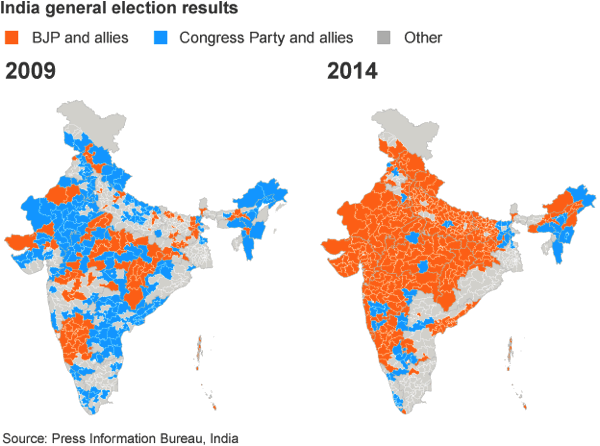
Even a cursory glance at the electoral map of India will reveal the magnitude of BJP’s victory and the virtual annihilation of the Congress Party. Indeed, borrowing a page from Indira Gandhi’s victorious 1971 Garibi Hatao (“Eliminate Poverty”) campaign that projected her as a presidential-style candidate, Modi bested the Congress led by her daughter-in-law and grandson, by jettisoning the BJP’s Hindutva rhetoric and projecting himself as a no-nonsense champion of free enterprise and corporate capital.
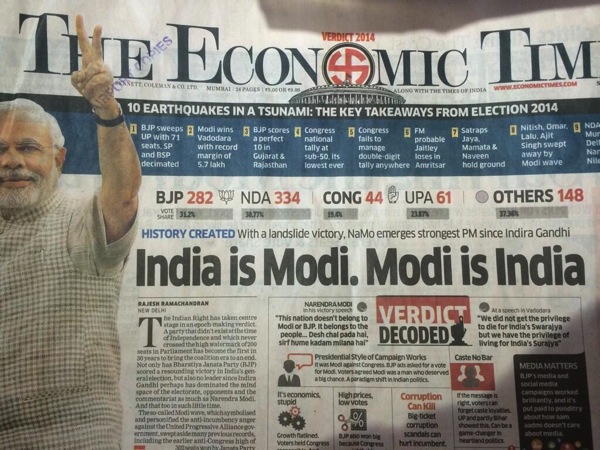
In the first instance, the BJP’s stunning victory was a complete repudiation of the Congress—just as the 1977 Janata Party triumph was a repudiation of Indira Gandhi’s Emergency Rule. After having delivered high rates of economic growth during the Congress-led First United Progressive Alliance (UPA) term (2004-09), the country’s growth rate was halved during its second term (2009-14), even though at an annual average of 5.4%, it was still respectable in world terms when other economies are limping along at 0.1% to 2% annual growth rates. Rejection of the Congress stemmed from the Manmohan Singh government’s seeming inability to promote any bold initiatives when the economy was sluggish and inflation had risen to a three-month high in April, just as the massive nine-stage election got underway.
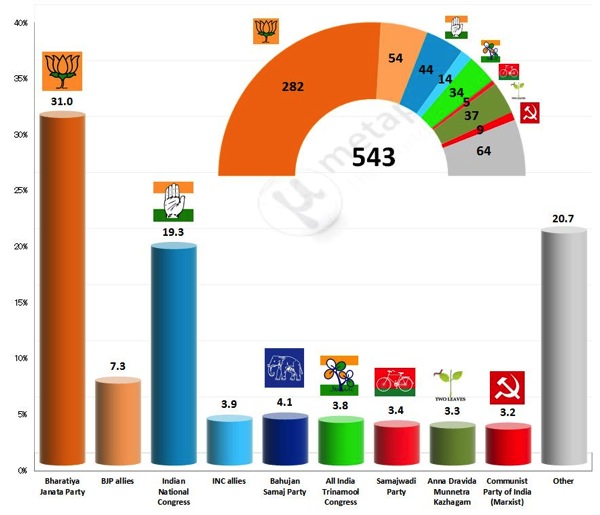
As pessimism about the economy mounted, Modi projected his ‘vibrant Gujarat’ as the model for India—a model with 24-hour electricity, a thriving agricultural sector, and the world’s largest oil refinery. Modi’s no-nonsense approach to industrialization was manifested by his invitation to Tata to produce his Nano car in Gujarat in 2006 after a two-year long farmers’ protest in Singrur, West Bengal led the company to abandon the project there. Modi immediately welcomed him to Gujarat, cut through the red-tape, and signed an agreement in a record 10 days with Tata Motors. This was, as Vinod K. Jose underlined, Modi’s decisive shift from brutal Hindutva to a corporate friendly strategy. When industrialists had once castigated him for his role in the Godhra massacre of Muslims in 2002, now they began courting him. As did intellectuals—Jagdish Bhagwati who had earlier castigated him for the Godhra massacres, told the Financial Times in an interview in April that he would be “optimistic” about India’s economic prospects only if Modi was elected prime minister. Colliding with corporate campaigns to promote Modi, the largest English-language newspaper in the country, the Times of India, “innovated a revenue-stream called ‘paid news’.”
Large corporate donations, and a slick media campaign allowed Modi to campaign all over the country—often holding five mass meetings a day—appearing in regional costumes and spending an unprecedented amount of money as India has no limits to campaign spending. Campaigning in presidential style, Modi offered as Pankaj Mishra pointed out
top-down modernisation, but without modernity: bullet trains without the culture of criticism, managerial efficiency without the guarantee of equal rights. And this streamlined design for a new India immediately entices those well-off Indians who have long regarded democracy as a nuisance, recoiled from the destitute masses, and idolised technocratic, if despotic, “doers” like the first prime minister of Singapore, Lee Kuan Yew.
And his messages were cloaked appropriately for a vast country with different electorates and he reaped a national harvest of votes except in the southern states where his economic message did not carry as these states were doing better than his ‘vibrant Gujarat’ or the East—where association with the Congress did not taint the regional parties in power.
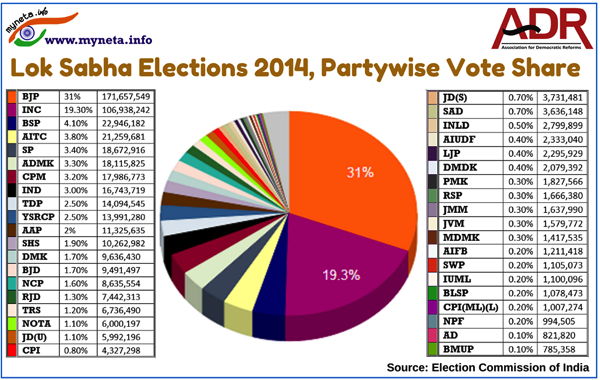
The Congress, in turn, has been reduced to a shell of its former self—its members in the Lok Sabha plummeting from 206 in 2009 to a mere 44 in 2014, not enough for the leader of its parliamentary party to be recognized as the Leader of the Opposition. As the journalist T N Ninan pithily summarizes the plight of what was once the natural party of government:
The Congress… is now without a strong base anywhere, having been wiped out in its earlier stronghold of Andhra Pradesh, bested in Karnataka, routed in Maharashtra, sidelined in West Bengal, marginalised in Uttar Pradesh, and drawn a virtual blank in more than half a dozen key states across the heartland – a repeat of its rout in the state elections five months ago.
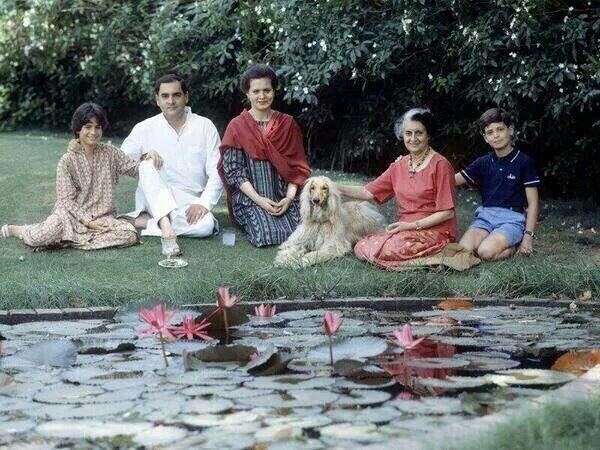
That this was not an anti-incumbency vote is indicated by the spectacular success of the AIADMK in Tamilnadu which captured 37 of the 39 seats and denied even a single seat to its regional rival, the DMK which was itself enmeshed in the corruption scandals of the Congress party and mired in a feud within its first family; the Trinamul Congress in West Bengal; and the Biju Janata Party in Odisha.The Left had nothing to offer the electorate. After their hopes of a Third Front were cynically dashed by Jayalalithaa who refused to allocate them a single seat in Tamil Nadu, they were left making rote noises about the evils of communalism, privatization, and globalization. The CPM’s long rule in West Bengal had increasingly isolated it from the masses as shown by its brutality towards villagers in Nandigram and Singrur. With its lack of political imagination and creativity, as Shiv Vishvanathan says
The Left leadership of Mr. Bardhan and Mr. Karat belong to a Tussauds of Marxism and one hopes the Left generates new leaders open to a new language of politics and justice. Numbers must generate rethinking in these parties.
Just as much as the sluggish-ness of the economy, it was the corruption scandals that plagued the Manmohan Singh government. Instead of holding open auctions, the government allocated coal-blocks worth some ₹1.86 lakh crore (almost $30 billion) to private firms without any transparent criteria. So too were the 2G and 3G cellular spectrums allocated to private mobile networks. And since 2004, in the run-up to the 2010 Commonwealth Games in Delhi, as Vishvanathan noted,
nearly 400,000 people from three large areas of Delhi were displaced, in a series of indiscriminate evictions reminiscent of the last days of the Emergency, to make way for new construction connected to the games. The tournament infrastructure was built with rampant violations of protections like the Minimum Wages Act, and with the widespread use of child labour. The litany of moral failings could go on.
Even when pressed in the only interview he gave in 10 years, Rahul Gandhi, the Congress vice president and dynastic heir apparent, could not explain why the party failed to take action against those found guilty of corruption or continue to nominate them as candidates. His stumbling, inept performance in the election campaign, rarely answering the charges that Modi hurled at him, his mother, and the ‘dynastic’ politics of the Congress only solidified Modi’s image as a dynamic leader. As the journalist, Rahul Pandita, wrote:
And yet, if Modi jettisoned the rabid Hindutva rhetoric of the BJP, and indeed had marginalized its affiliated organizations like the RSS and the VHP in Gujarat, in the three elections he led in his home state, the BJP did not offer a single seat to a Muslim despite the community accounting for 10 percent of the state’s population. And of the 282 members of the BJP elected to the 16th Lok Sabha, not a single one is a Muslim—its lone Muslim candidate, Syed Shahnawaz Hussain, having lost the election. In his native Gujarat, Muslims are condemned to live in ghettos akin to the Jewish ones in pre-Second World War Europe as they are prevented from renting or buying houses in “Hindu” areas.
Unlike Modi, his key lieutenants, especially Amit Shah, the BJP General Secretary, said that the election was to seek “revenge” against the Muslims in Uttar Pradesh. And in neighboring Bihar, another senior BJP leader, Giriraj Singh, invited all those opposed to Modi to “go to Pakistan.” As a consequence, surveys suggest that the Congress increased its vote share of Muslims substantially—from 33 percent to 44 percent in Delhi’s Chandni Chowk constituency, and to over 90 percent in Madhya Pradesh and Chhatisgarh. Conversely, the Hindu vote consolidated for the BJP. This does not bode well for communal relations. Already there are reports of jubilant BJP supporters throwing stones and breaking windows of mastoids, of Muslims being beaten up for not participating in BJP victory processions.
Nor does it bode well that a third of the new MPs face criminal charges—and these are spread across the political spectrum.
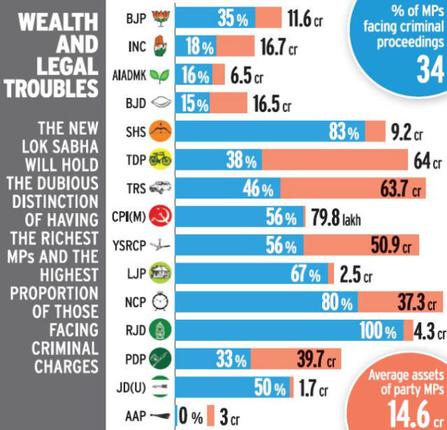
The scale of Modi’s victory and his record of cutting his rivals down in Gujarat casts him as an Indian strong man, an Indian Caesar. With the 330-odd seats that his National Democratic Alliance commands in the Lok Sabha, it is believed that he would not have to cater to the demands of his coalition partners as his BJP has enough seats to govern on its own. Though much of the implementation of economic programs depends on state legislatures, the magnitude of his victory his supporters believe will compel the states to comply with the diktats from Delhi. Once Modi gets the government out of the way and stop pampering the poor and the lazy, the narrative purveyed by the business-friendly press suggests, nothing will stop bold, innovative, enterprising entrepreneurs from making the twenty-first century, the “Indian century.” As the scale of Modi’s victory became apparent, stock prices in Indian bourses rose exponentially, and Mukesh Ambani, the country’s wealthiest man and ardent Modi supporter saw his net worth increase by $1 billion in a single day!
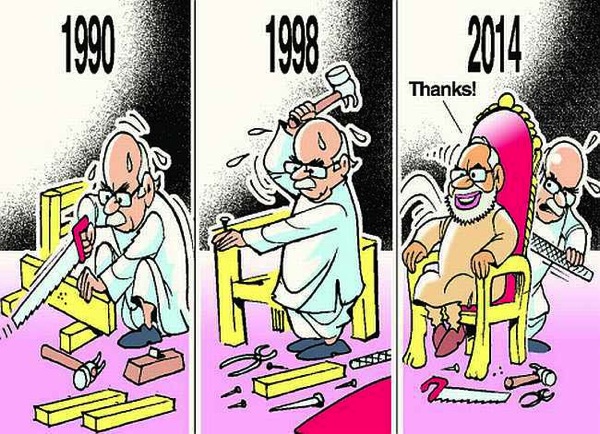
Gita Gopinath and Iqbal Dhaliwal, respectively professors of economics at Harvard and MIT, articulate the new wisdom that Modi will de-regulate the economy and India will rapidly rise in the “Ease of Doing Buisiness” rankings; that the flood of investments will lead to greater employment and as labor costs in manufacturing rise in China, India will become the natural harbor for companies seeking a cheaper workforce and there will be prosperity for all. What is crucially missing from this fairy tale is that this has been the predictions of every neoliberal experiment since the coup in Chile in 1972 and none of it has borne fruit. By neglecting primary and secondary education since independence, India has a very poorly trained labor force in comparison to China; by neglecting health expenditures, India even trails Bangladesh in many key indicators. The country’s infrastructure—roads, ports, electricity, water supply—are in shambles. And in manufacturing the world over, labor’s share in profits and plummeting as increasingly production is driven by numerically-controlled machines and robots, so greater industrialization does not necessarily lead to greater employment. In fact, by eschewing the social democratic redistributive measures, pursued albeit half-heartedly and ham-handedly by the Congress, Modi will further decrease India’s competitiveness.
Blog at WordPress.com.
Entries and comments feeds.

